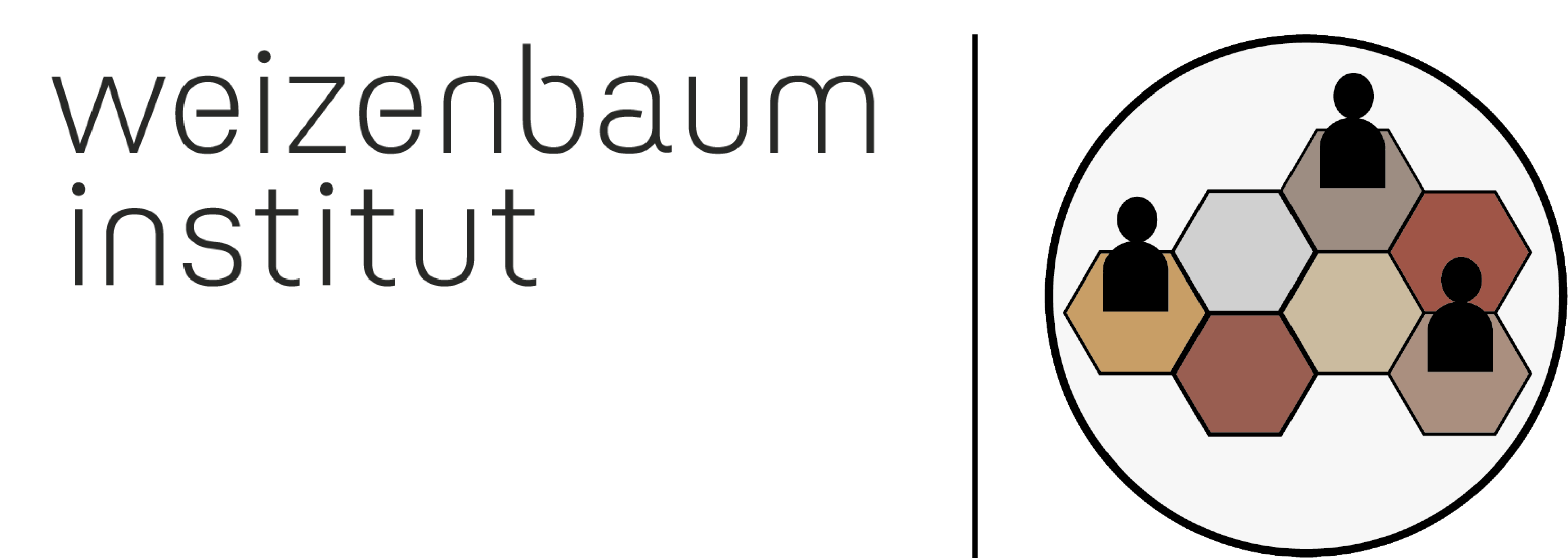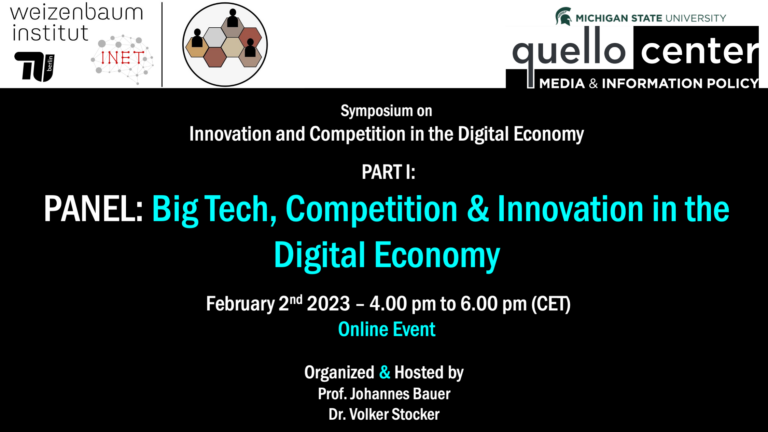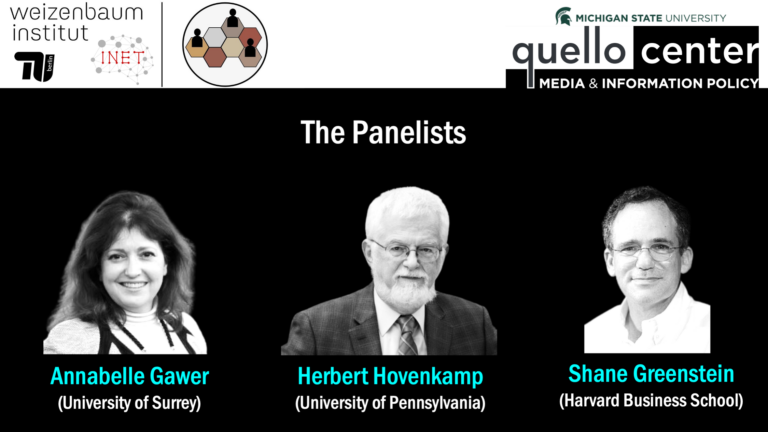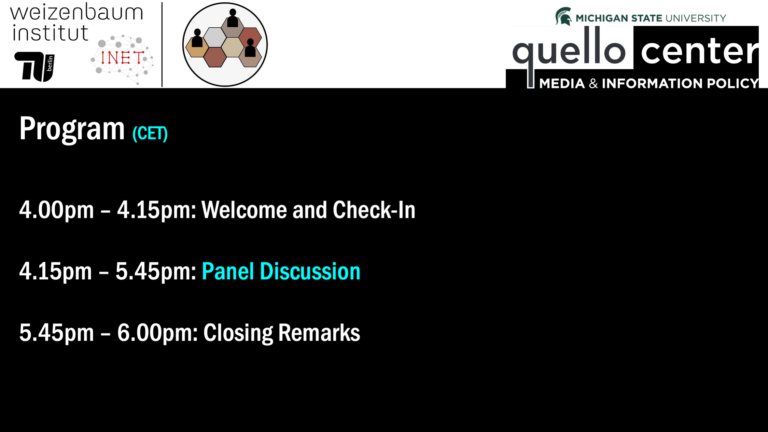Online Symposium
Innovation and Competition in the Digital Economy
Part I: Big Tech, Competition & Innovation in the Digital Economy
2 February 2023, 4.00pm to 6.00pm (CET)
The panel is part of the Symposium on Innovation and Competition in the Digital Economy jointly organized by Prof. Johannes M. Bauer, Quello Center at Michigan State University, and Dr. Volker Stocker, Weizenbaum Institute for the Networked Society.
The event will provide a stimulating venue for researchers from multiple fields, including economics/management and law, to discuss their work and perspectives on the roles of big tech for innovation and competition in the digital economy. Specifically, we would like to discuss the impact of big tech companies on competition and their effects on innovation in digital ecosystems, and we want to explore these issues from national and international perspectives.
To maximize time for discussion, all panelists will present an opening position. After these introductory remarks, we will move into a moderated panel discussion and then wrap up the discussion with a Q&A with the audience.
The first panel of the Symposium on Innovation and Competition in the Digital Economy was jointly organized and moderated by Prof. Johannes M. Bauer (Director of the Quello Center at Michigan State University) and Dr. Volker Stocker (Head of the research group “Digital Economy, Internet Ecosystem, and Internet Policy” at the Weizenbaum Institute for the Networked Society) and was held online on 2nd February 2023.
The rise of bigtech companies has caused much debate and scrutiny, with policymakers worldwide grappling with reining them in and installing new regulatory guardrails for the digital economy. Regulators in the EU and the US have taken steps to mitigate the (potential or anticipated) harm to competition and innovation posed by these companies by imposing large fines and implementing new regulations. In this context, it becomes highly important to connect insights and debates from law, economics and management to evaluate the impact of big tech companies on competition and their effects on innovation.
The panel provided an exciting opportunity for researchers, academics, and professionals to discuss some of the most pressing issues surrounding big tech and its impact on innovation and competition in the digital economy. Three outstanding scholars . The panel will present opening positions, engage in a moderated discussion, and conclude with a Q&A session with the audience.

Program (CET/Berlin Time)
16.00 – 16.15: Welcome & Check-in
16.15 – 17.45: Panel – Big Tech, Competition & Innovation in the Digital Economy
17.45 – 18.00: Closing Remarks
Panelists
Annabelle Gawer
(University of Surrey)
Shane Greenstein
(Harvard Business School)
Herbert Hovenkamp
(University of Pennsylvania)
Theme 1 - Digital Platforms: Sharing, Innovation & Regulation
Session 1
Herbert Hovenkamp
University of Pennsylvania
When brands regulate markets
Abstract: Within the sharing economy, ridesharing firms like Uber have been touted as disruptors that have shaped the private transportation hire and taxi markets globally. Scholars, governments, and policymakers disagree over the need to regulate rideshare and other businesses in the sharing economy, highlighting the dangers of no or too much regulation. However, these calls assume that existing markets are well-regulated, and thus regulating sharing economy firms will bring them in line with existing regulations. What happens when sharing economy firms enter markets where regulations are poor or non-existent? In this paper, we demonstrate that in such markets, sharing economy firms become the regulators. We conduct our research in Ghana, a market in which consumer transportation has been highly fragmented with very little regulation and poor enforcement of these regulations. We find three mechanisms through which sharing economy brands regulate the rideshare and taxi markets in Ghana using the technological affordances of their platforms: algorithmic pricing, platformed customer journey, and normative compliance. We examine the consequences this regulatory role has for the sharing economy firms and the market, especially since it is a role assigned to them by the market or regulators and not a role they intend or take on willingly. This analysis allows us to contribute to the marketing literature in three ways: demonstrate how sharing economy firms regulate markets and what happens when they do, unpack the role of firms as regulators, and show how the technological affordances of their platforms enable them to perform this regulatory role.
Giana M. Eckhardt is Professor of Marketing at King’s Business School, King’s College London. Giana is a leading expert in the field of consumer culture, consumer ethics, branding, and the sharing economy, publishing regularly in journals such as Harvard Business Review, Journal of Marketing, Journal of Marketing Research, and Journal of Consumer Research. She is co-author of The Myth of the Ethical Consumer (Cambridge University Press) and co-editor of Handbook of the Sharing Economy (Edward Elgar). She is past co-chair of the Consumer Culture Theory conference and the Association for Consumer Research conference, is Associate Editor of Journal of Consumer Research, and is on the editorial review board of Journal of Marketing and International Journal of Research in Marketing. Her research has been featured in outlets such as The Wall Street Journal, The Economist, Vice Magazine, The Atlantic, Fortune, Vogue, The BBC, and on National Public Radio, among many others.
Theme 2 - New Forms of Work, Algorithmic Cultures & Inequalities
Session 3
Alessandro Gandini
Università Statale di Milano
'Platformized' labor: The Case of Neo-craft Work
Abstract: In the decades-long debate on digital labor, originated by the seminal article on ‘free labor’ by Tiziana Terranova (2000), a relevant position has been occupied by the critical discussion of processes of ‘platformization’ of work. This, however, has mainly revolved around two specific types: a) platform-based work, where the platform directly organizes and oversees the capital-labour relation (e.g. Uber, Deliveroo, freelance marketplaces); b) platform-dependent work, whereby platform activity constitutes the essential component of one’s work, but workers’ tasks are not directly organized/overseen by the platform (e.g. content creators/influencers). Processes of platformization of work today, however, do not limit to these instances, but increasingly blur the boundaries of other forms of work that are not necessarily concerned with a direct engagement with digital technology.
This paper aims at developing a more accurate definition of this kind of ‘platformised’ labour, with this term intending all work whereby social relations of production are repurposed (in part or in full) by way of platform intermediation, despite it not necessarily being enabled by, or undertaken through/on, a digital platform. To do so, it looks at the case of ‘neo-craft’ work (Land, 2018; Bell et al., 2018), which has come to identify a new form of craft work characterized by the peculiar combination of traditional craft – that is, “concerned with the skilful production of high-quality products” – with “a post-industrial imaginary” (Land, 2018: np; Ocejo, 2017). Based on data collected in the context of the ERC-funded project “CRAFTWORK”, constituted of a combination of digital methods and qualitative research, the paper critically discusses how social relations of production in neo-craft work are repurposed (in part or in full) by way of platform intermediation, suggesting that neo-craft workers represent a peculiar type of global cultural labourers whose activity cuts across the changing nature of labor and work in platform-based cultural production (Poell et al., 2021).
Alessandro Gandini is Associate Professor of Sociology at the University of Milan. His research focuses on the critical study of work and technology, digital research methods and algorithmic cultures. He is the Principal Investigator of the “CRAFTWORK” project (2021-2025), funded by ERC-Starting Grants.



